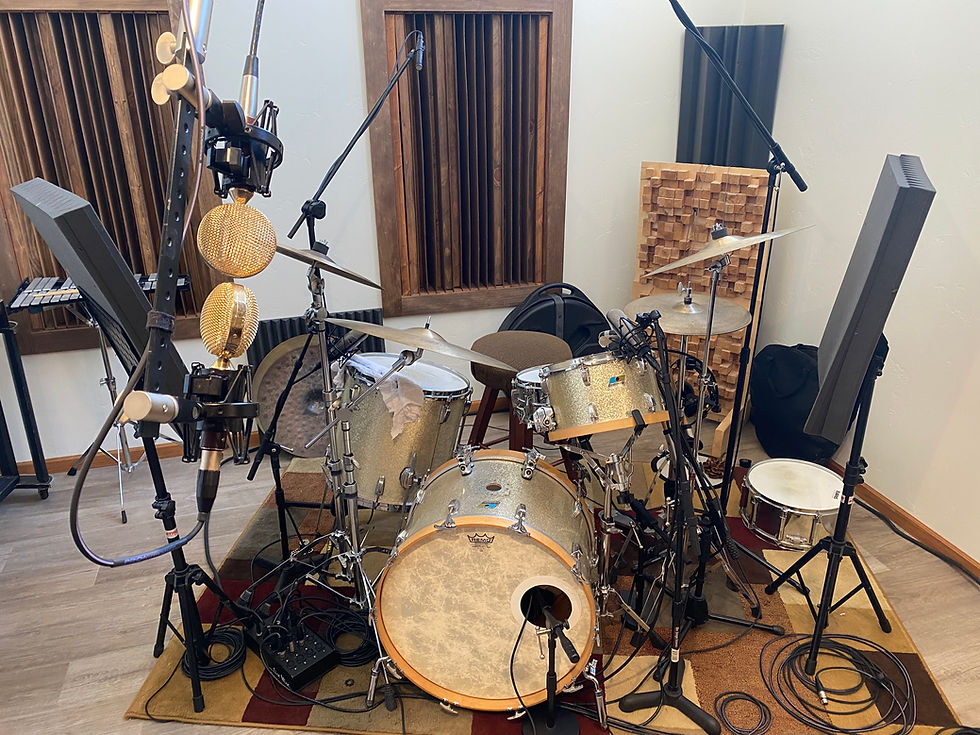The Importance of “Scratch” Recordings
- Nic Tassone

- Jul 11, 2025
- 4 min read
Updated: Aug 13, 2025
Right now I’m in the process of preparing for an upcoming multi-day recording session and wanted to share a behind-the-scenes look at what goes into this preparation. The plan is to produce a collection of 10 good songs (yes, that's a Theo reference) - ranging from small instrumentals to full-band arrangements with vocals, some production-heavy, others raw and natural sounding. With such a big range of songs and styles on this album, it is incredibly helpful to have some scratch recordings to help me wrap my head around the songs and prepare for our sessions.
I was sent demos, or “scratch tracks,” for each of the 10 songs. Some of these demos have a more developed sound, others are little more than rough vocals and acoustic guitar recorded into a phone. The important thing is that they allow me to get a feel for the songs before we’re working together in the studio. Having an idea of the style of music, song forms, instrumentation, etc helps me to more accurately prepare for recording. Saying “it should sound kinda like this” and then playing the song can convey a lot more information than trying to explain the song. Music is so personal and subjective and it’s easy for breakdowns in communication to cause misalignment between artist and producer, sending the song’s production in the wrong stylistic direction.
Accompanying the 10 scratch recordings was a Google doc that listed tempos for each song and, when relevant, notes about time signature changes or if there’s something specific he wanted to happen in the song that may not have come across clearly in the demo. Also included are notes on reference songs/artists that we should be trying to get a similar sound to. Saying “I want a huge drum sound” might mean in-your-face compressed drums, or it might mean drowning the drums in reverb. By having reference songs to listen to, I can easily interpret what the artist is looking for. With all this info being shared with me via Google doc, it also allowed me to write my own comments/questions/suggestions. It’s little things like this that help us hit the ground running when the recording session starts.
After listening through the demos, I’ve determined we’ll need a very dry/fat snare sound ready to go, and the kick drum doesn’t need to be aggressively deep. Overall, we’ll be going for a natural drum sound so rather than worrying about close miking everything and getting a hyped-up drum sound, I can focus on preparing the drum set to sound good miked as a whole. This also tells me I need to prepare the room to support this kind of drum sound. My new recording space is sounding fantastic after installing a bunch of acoustic treatment, and I’m very excited to be able to get a naturally roomy drum sound without having to rely on reverb plugins. By having the kick, snare, and toms tuned and dampened appropriately, we won’t have to waste time during the recording sessions finding the right drum sound.

I’ve also started setting up Logic project files for each song. Since the demos were all recorded to a metronome, I could drag and drop them into a Logic session and set the tempo to match. I then started setting up the tracks and routing within the Logic session that we’ll need when we start recording. Drum tracks, buses, reverb sends, etc take time to set up and rather than killing the flow of the recording session, I can have a lot of this done ahead of time. I can even send the scratch track through some reverb/delay sends and start dialing the right kind of ambience to fit the song. All of this may change later on in the project, but having a solid starting point is going to accelerate the beginning of our time recording together.

So the scratch tracks are really helpful for getting the project started on my end. But they’re also very helpful to the artist throughout the recording process. Have you ever said the same word so many times that it doesn’t sound like a real word anymore? When you’re recording, you sometimes end up playing the same part over and over before you get the perfect take, and after doing something so many times you can start to forget how you sang certain parts or what sound you were originally going for. Being able to give the original scratch track a quick listen mid-recording session is a great way to reference parts and to stay grounded in your original artistic vision for a song.
Send me you scratch tracks and let’s get started recording your next musical project!
Comments